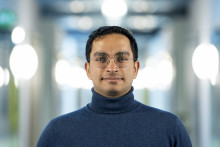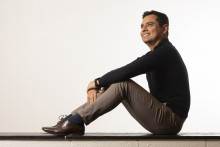Shreyas Harsha
PhD research topic: The development, testing and optimization of nano-structured electrodes for the purpose of electrochemistry through solid-state dwett
Works at: Photocatalytic Synthesis group at the Faculty of Science and Technology (TNW)
Studied: Energy and Process Technology at TU Delft
Originally from: India
‘Doing a PhD was always on my mind. I didn’t pursue it right away, because I couldn’t find any interesting topics and I thought that PhD was always going to be an open opportunity, so I wanted to try out industry first. After I graduated my Master’s in Delft, I started working as a process research engineer in a start-up in the chemical industry. But Covid hit us really hard. There were funding issues, there were issues with my visa and suddenly I was let go. I had three days to pack up my stuff and leave. I wanted to stay in the Netherlands, so I was looking for different jobs and opportunities, but it was Covid and nobody was hiring. I ended up working as an HR recruiter, which meant leaving science but it also allowed me to stay in the country, so I was happy to do it.
My intention was always to go back to science and I started looking for PhD positions. Working for the start-up showed me how research worked and it reinforced the idea that PhD was something for me. Life of a PhD candidate excited me. I knew it was going to be tough, but it was a good challenge. Doing research was always my goal. I never considered other roles, such as consulting. I always saw myself as a researcher.’

‘My doctoral research is about the development of nanostructured electrodes for electrochemical purposes. Broadly speaking, this research relates to producing green chemicals and electrochemistry. Green chemicals need to be produced in a sustainable way and that can be achieved through proper catalysts. I work on nanoparticle catalysts, which are incredibly small. I’m focused on using a new technique to produce these catalyst nanoparticles and utilize them in electrochemistry.
‘I didn’t realize how difficult it would be to switch fields’
My research combines material science, chemical engineering and nanotechnology. When I was reading the vacancy for this PhD project, I knew it was interesting, even though I couldn’t fully understand it. I knew absolutely nothing about nanotechnology and material science. But I wanted to move away from mechanical engineering and focus on something that could impact sustainability, and so I went for it. I didn’t realize how difficult it would be to switch fields. I had to go back to high school level. I have felt overwhelmed with the amount of things I didn’t understand, with the terms I wasn’t aware of. I still struggle with it sometimes, but now I like the challenge. I even told my supervisor at a point that I didn’t know what I was doing, but luckily he assured me that PhD is not about knowing everything. It’s about figuring it out. My supervisor was very sympathetic and supportive, he sat me down for a couple of hours and explained how it all works. He told me that even professors have these problems, so I knew I wasn’t the odd one out. Now I take it one day at the time, I look up what I need to that day. I know how to handle it now and I’m starting to enjoy my research more.’
‘I’ve only started my PhD this year, but there haven’t been any major surprises so far. I spoke to a lot of doctoral candidates before I even applied for a PhD position, and so I knew what I was getting myself into. Most of them told me that PhD is about knowing how to handle failures, rather than enjoying successes. That is 90% of PhD life. I knew it was going to be like that, I knew it was going to be tough, and so I was ready for it. What keeps me going? At the end of it all, I can add ‘doctor’ to my name. That is a big motivation for me. Also, I have a good vision of what the end result of my research should look like. Every day I’m one step closer to that goal. Moreover, it is the joy of science. You are exploring something that nobody else has explored before.
There are a few simple things that nobody really told me about, though. My project is about 90% lab work. However, working in a lab doesn’t mean running experiments all the time. Most of the lab work is about fixing and preparing your equipment first. It’s about finding a new power cable, because the one you have doesn’t work. It’s about ordering new bottles, because you ran out and having to wait two weeks before they arrive. It’s about coordinating and planning, because you share the equipment with many other people. An experiment of one hour can usually takes like two days to prepare. That is something nobody really told me about.
‘You are not alone on this journey’
I thought that science would be very competitive, but I found everyone to be very open and friendly. You can ask the dumbest question and someone will give you a helpful reply. You just shouldn’t be afraid to ask. Because sometimes you find out that everyone struggles with the same thing and it’s not so dumb after all. If you communicate enough, you will get enough advice. You are not alone on this journey.
I have no regrets about starting a PhD. I’m happy. I’m where I want to be. But maybe I haven’t had enough failures yet, so I’m still very optimistic. I know failures will be part of the journey and I’m prepared for it.’








